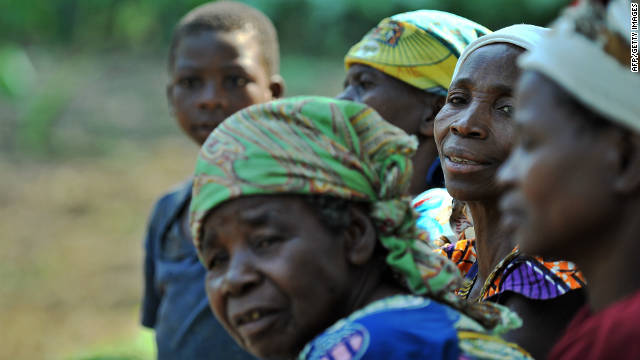Your
cell phone, Congo's misery
By Robin Wright, Special to CNN
November 28, 2011 -- Updated 1437 GMT (2237 HKT)

People gather in Kanguli village in southeast Democratic
Republic of Congo in July.
STORY HIGHLIGHTS
- In Congo, militia groups and army factions control many mines, says Robin Wright
- Minerals in these mines go into cell phones, laptops, digital cameras and other products
- Congolese mine work is back-breaking, perilous and poorly paid, Wright says
- In Congo, more than 5 million have died through war and hardships in the past decade
Editor's
note: Actor
and activist Robin Wright recently traveled to eastern Congo with the Enough Project, a Washington-based group
focused on ending genocide and crimes against humanity. Her video trip diary
appears as a special feature on a new UK edition of "Blood in the
Mobile," available on DVD.
(CNN) -- A 10-year-old boy, his face
still innocent, abducted from his village and forced to kill alongside ruthless
militia fighters. A 60-year-old grandmother too ashamed of the injuries caused
by a brutal rape to leave her house for five months, even though her wounds
worsened. A girl who reminded me of my own daughter, bridging the years between
youth and womanhood, who had been dragged into a forest near her house by a
group of men and raped, over and over again.
Images of
these people, whose quiet but warm personalities barely hint at the atrocities
they have survived, give a human face to the conflict in eastern Congo that has
long moved me as an activist. With well over 5 million people dead through war
and its accompanying hardships spanning more than a decade, it is difficult to
imagine the daily impact of a conflict of this magnitude, much less to feel
empowered to do anything about it.

Robin Wright
A new
documentary film, "Blood in
the Mobile," powerfully addresses both the limits of the
imagination and our sense of connection to atrocities committed on the other
side of the world. Through a shaky camera in the damp and dark mines of eastern
Congo, filmmaker Frank Poulsen introduces us to some of the young men (and even
children) toiling at the first stage of Congo's lucrative business in tin,
tantalum, tungsten and gold. But the wealth of this industry doesn't really
benefit the Congolese miners for their back-breaking, perilous and poorly paid
work -- not by a long shot.
Militia
groups and factions of the Congo's army control many mines, imposing heavy
"taxes" on miners for whom there are few alternatives for making a
living. Juxtapose these gritty images of Congo with shots filmed at the
headquarters of Nokia, the electronics powerhouse that sells these minerals in
its consumer products, and you have a message that is difficult to ignore: the
cell phones, laptops, digital cameras and other products we have come to rely
on link all of us to the conflict in Congo.
As
consumers, we're perpetuating the conflict. We have an obligation but also an
opportunity.
I was
fortunate to have a chance to travel to
eastern Congo recently to see with my own eyes and to feel, even
with the relative safety of traveling with the ever-attentive Fidel Bafilemba
of the Enough Project, the psychological effect of spending time in an
unpredictable conflict zone. I was struck by how we witnessed the raw, nervous
strain of communities said to be post-conflict, post-traumatic.
But
nothing seemed to be "post-": Indeed, these communities appear to be
enduring conflict and trauma on a daily basis. Local organizations, from the
reintegration center for child soldiers to the rehabilitation center for survivors
of sexual violence, are working as hard as they can to provide solace and a
hopeful future for those most physically and emotionally harmed by the
conflict. But as necessary as these efforts are, they treat the symptoms; there
is little concept of pre-emptive or preventive.
Two years
had passed since U.S. Secretary of State Hillary Clinton came to one of the
same towns I visited. Nearly everyone I met remembered "Mama Clinton"
and asked me to follow up with her when I returned to the United States. "I
think it is no secret to you," one woman said, speaking into the
videocamera and addressing Clinton. "Our wealth is being plundered, and
that's why we are being raped." She urged Clinton to make good on her
promise to bring high-level U.S. attention to the crisis in Congo.
In
particular, Clinton's leadership and gravitas are needed to implement an
international certification scheme that enables companies to trace the source
of the minerals to ensure that they aren't funding armed groups, and that
allows consumers to choose which companies to give business to, based on their
human rights record in Congo.
Visiting
Congo for the first time without knowing the local language, Kiswahili, I was
dependent on my talented interpreter Fidel for putting into words my countless
questions and gratitude to the people I interviewed. But in those moments when
I sat face-to-face with women, neither of us speaking while we listened to his
translation, I would often catch a look, a slight nod, that clearly said,
"I know you know. I know you understand."
Women have
a natural, inherent knowingness, an unspoken connection between us, as mothers,
wives and sisters. For several years I have followed Congo from afar,
understanding theoretically and intellectually how we in the United
States could help end the conflict. Now I deeply feel the why.
http://edition.cnn.com/2011/11/28/opinion/wright-congo/index.html?hpt=op_t1
No comments:
Post a Comment